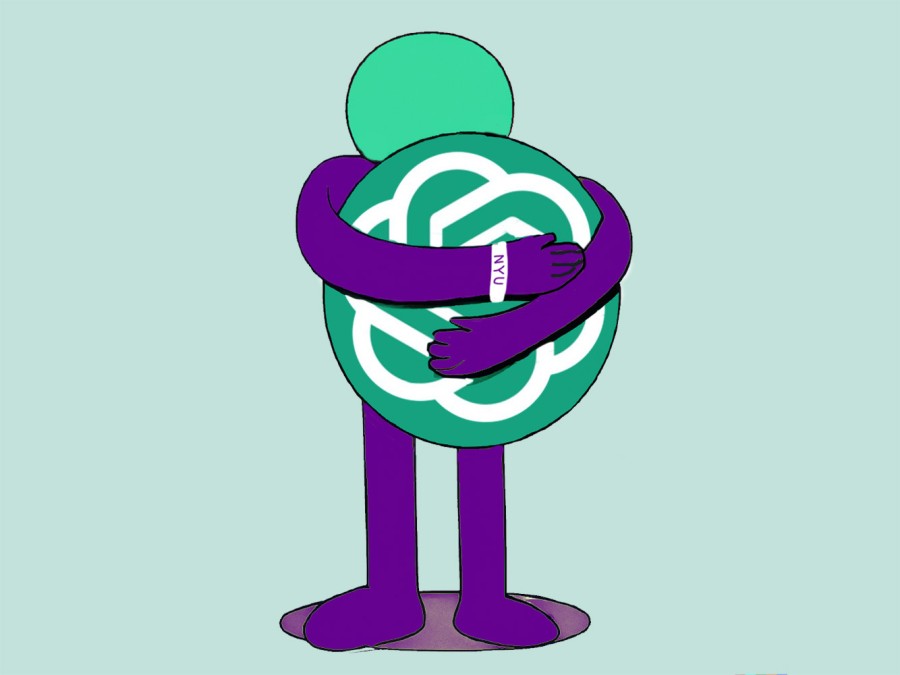Opinion: ChatGPT has untapped potential for use in the classroom
Dall-E, the image generation AI system created by OpenAI, the same corporation behind ChatGPT, created part of this illustration. (Illustration generated with Dall-E, edited by Samson Tu)
February 27, 2023
Artificial intelligence is changing the world as we know it, and now it’s making its way into education with the emergence of ChatGPT. Media and educators alike have been abuzz since its debut, with some impressed by the technology and others worried about its potential misuse in educational settings.
While some universities have banned ChatGPT in their syllabi, others have opted to modify essay and exam prompts to make it more challenging for the tool to answer them on a student’s behalf. However, instead of focusing on the potential misuse alone, educators should explore the ways they can use ChatGPT as a supplemental instructional tool to promote positive outcomes.
If students use the technology to generate entire essays, it’s evidently an issue that undermines the purpose of completing an assignment in the first place. But the conversation around ChatGPT typically begins and ends with the ways in which it can be abused.
ChatGPT has many benefits, and banning its use in classroom settings only makes using the AI to cheat more appealing, as restrictions inherently foster intrigue. NYU does not have a policy that covers the use of this tool and its restrictions yet, but professors should consider embracing the new technology and its academic potential.
With the arrival of new technology comes the opportunity to use it to enhance productivity or to disrupt a system. The calculator, a now universal tool used to assist students in all kinds of mathematical tasks, can easily be used to avoid doing the work necessary to understand basic mathematical concepts, such as multiplication and division. But just because we recognize the potential for abuse of calculators doesn’t mean we’ve resorted to banning them. Instead, instructors discourage inappropriate uses while finding ways to positively implement technology in their courses. The same approach should apply to AI like ChatGPT.
We shouldn’t feed into our initial misgivings of fear and panic about this new and life-changing technology — we should spend more time considering how we can use these new systems to our advantage. ChatGPT can supplement classroom instruction by providing additional resources to students who want to deepen their understanding of a given subject.
Professors can use the technology to generate examples for class assignments. For example, students, especially English language learners, could use the model to receive feedback on their spelling and grammar, allowing them to refine their work.
ChatGPT could also be used as a way to develop information literacy skills by having students analyze AI-generated texts to find misinformation. Teachers could use ChatGPT to generate text about different topics, and then task students to evaluate whether the output is accurate — sharpening their research and critical thinking skills. These examples represent only a small sample of positive uses for ChatGPT as an educational tool. This makes it all the more tragic that we seem to be so focused on its downsides.
As students, we are taught from an early age that academic integrity is a core value of education. Throughout middle and high school, we are constantly told never to copy the work of others and try to present it as our own. In every NYU course syllabus, there is a section titled “Academic Dishonesty and Plagiarism” or some variation of that, as NYU requires it.
Given this emphasis on academic integrity, it shouldn’t come as much of a surprise that academics and educational institutions alike have heavily scrutinized ChatGPT. The New York City Department of Education banned access to ChatGPT’s website on public school internet networks. This decision may have been made due to concerns about the content and safety of the website, but the move has also resulted in limiting the educational resources available to students — particularly those who rely on the website for language learning or access of academic materials.
While it is important to recognize potential drawbacks, it is equally important to consider the opportunities presented by new technology. Educators should encourage their students to engage with the positive aspects of ChatGPT in ways that can further their education, rather than simply banning its use. By utilizing ChatGPT and other emerging technologies to supplement classroom instruction, we can promote more positive outcomes for students, and ultimately benefit the educational system as a whole.
WSN’s Opinion section strives to publish ideas worth discussing. The views presented in the Opinion section are solely the views of the writer.
Contact Phillip HoSang at [email protected].























































































































































